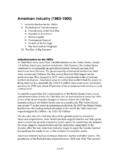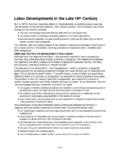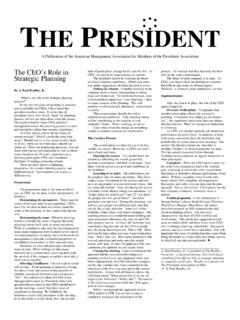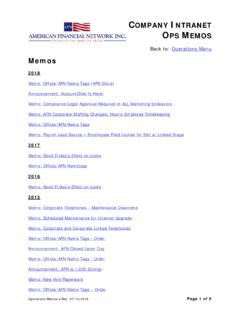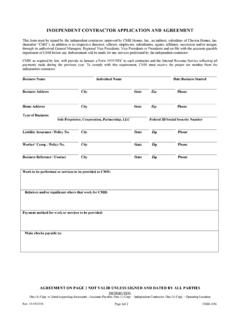Transcription of The Progressive Presidents - brfencing.org
1 The Progressive PresidentsTheodore Roosevelt: Masculine ProgressivismOn September 6, 1901, during a visit to the Pan- american Exposition in Buffalo, New York, president William McKinley was shot twice at point blank range by an anarchist named Leon Czolgosz. Initial reports in the succeeding days suggested the president s condition was improving, so vice president Theodore Roosevelt went on a vacation to Mount Marcy in upstate New York. He was returning from a climb to the summit of Mt. Marcy on September 13, when a park ranger brought him a telegram informing him that McKinley's condition had deteriorated, and, in fact, he was near death.
2 Roosevelt and his family immediately left for to Buffalo. On route, at 5:22am on September 14, Roosevelt received a telegram that McKinley had died a few hours earlier. Roosevelt was sworn in as president at 3:30pm on September 14. He became president just 6 weeks before his 43rd birthday. He had already achieved a very busy life. He was a Harvard graduate, had been an historian and author, a New York state assemblyman, a Dakota Territory Badlands rancher and deputy sheriff, a buffalo hunter, the Civil Service Commissioner, New York City Police Commissioner, Assistant Secretary of the Navy and Colonel and leader of his own military unit, the Rough Riders, in Cuba in the Spanish- american War, Governor of New York and vice president .
3 Wow!As a reform governor of New York in 1898, Roosevelt annoyed the New York state Republican Party machine boss, Thomas Platt. Roosevelt promised to root out state political corruption, and especially party machine politics. Platt wanted Roosevelt gone. The Republicans were looking for a vice presidential candidate to run with William McKinley in 1900 who came from the reform wing of the party. Platt suggested Roosevelt. Roosevelt had a reputation as a moderate Progressive . At the same time he was faithful to the Republican Party. He balanced the ticket Republican who was less than happy about Roosevelt as a vice presidential candidate was McKinley s campaign manager, Mark Hanna.
4 After McKinley s death, Hanna complained that, "I told McKinley that it was a mistake to nominate that wild asked him if he realized what would happen if he should die. Now look! That damned cowboy is president of the United States."Theodore Roosevelt was a brilliant thinker, politician and campaigner. Sickly as a child, Teddy forced himself to exercise and train to become a man through sheer determination. Life for him was an act of self-will. He was self righteous, ambitious, egotistical; for him everything was a contest and he meant to win. Teddy Roosevelt s ideas and worldview was fairly representative of the views of the educated upper and upper middle class american of the end of the 19th century.
5 He had absorbed both Populist and Progressive ideas and believed that that scientific thought could, in the hands of experts, cure the nation s ills. What makes Roosevelt different from most others of his class, was his own exuberance, and his own investment of personality into the office. 1 of 14 Roosevelt s presidency marks the beginning of the administrative state so dear to the European Progressives. Additionally, it is an an amazing imperial presidency; a period dominated by the sheer force of personality of Theodore Roosevelt, a larger than life chief executive if ever there was one.
6 Roosevelt believed that it was the president s duty to lead the nation by force of will, to use the office as a bully pulpit from which to preach a message of reform and shepherd the nation in the direction that he believed that it should go. Teddy Roosevelt was a vigorous, boisterous man, who brought his vision of reform to the fore in american politics by what amounted to a force of will and of personality. His was a masculine Progressivism that fit well with his powerful personality. The Square DealThe assassination of president William McKinley threw the conservative Republicans into a panic.
7 They feared that Roosevelt, might put into effect too many of his Progressive ideas. Roosevelt manifested a lively concern that his administration should afford a square deal for all Americans businessmen, laborers, farmers, and consumers. The Roosevelt AdministrationFirst State of the Union Message In his first State of the Union message in December 1901 Roosevelt called for: control of corporations by the federal government; authority for the Interstate Commerce Commission; of natural resources; of the merit system in civil service; of an isthmian canal; vigorous foreign speech was calculated to calm the fears of his more conservative party associates.
8 It was balanced between calls for reform and traditional Republican policy. We should remember here that the american people didn t elect a reformer in 1900. In fact, given a choice between an obvious reform candidate, Democrat/Populist William Jennings Bryan, and a conservative Republican incumbent, they had elected the conservative, William McKinley. So, Roosevelt, who had come to the White House over the dead body of McKinley, had to tread softly. In his first state of the Union Address, delivered just a few weeks after attaining the presidency, Roosevelt s speech sent a mixed message.
9 Part of it laid out a blueprint for extensive reform. Part or it supported traditional Republican his first term in office, Roosevelt s major reform activity was against the great industrial giants the so-called trusts. Whereas, more extreme reformers like Bryan were inclined to try to destroy these industries, Roosevelt believed that government regulation was preferable to destruction. He firmly believed that if the great trusts were well regulated they would provide a greater benefit to all workers, consumers, and businessmen than if these corporations were destroyed.
10 Roosevelt has often received criticism from left leaning historians for not going far enough as a reformer. He advocated trust busting, but distinguished between good The Progressive Presidents2 of 14trusts and bad trusts. He called for effective railway regulation, but was unwilling to either nationalize the railroads or over-regulate the industry. He was often critical of the more sensational muckrakers whom he believed offered criticism without offering solutions. He demanded a "square deal" for labor, but attacked extremists in the labor movement like Eugene V.
